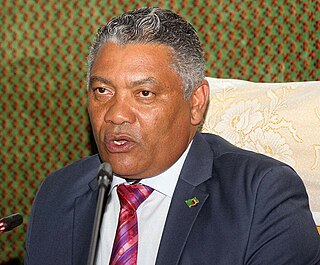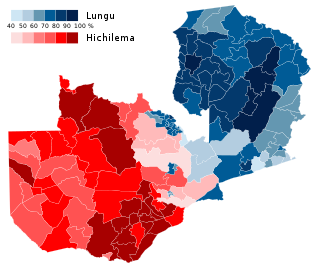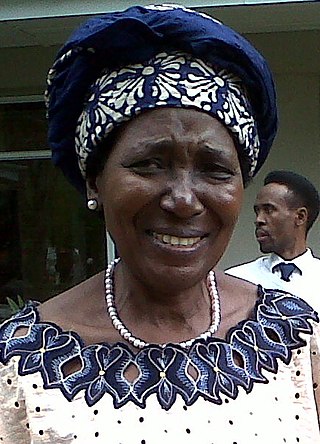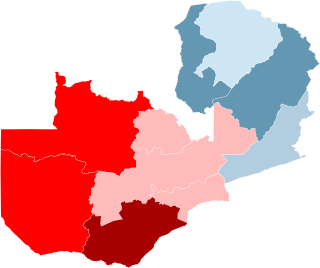
The politics of Zambia takes place in a framework of a presidential representative democratic republic, whereby the president of Zambia is head of state, head of government and leader of a multi-party system. Executive power is exercised by the government, while legislative power is vested in both the government and parliament. Formerly Northern Rhodesia, Zambia became a republic immediately upon attaining independence in October 1964.

The Movement for Multi-party Democracy (MMD) also known as New Hope MMD is a political party in Zambia. Originally formed to oust the previous government, MMD controlled an absolute majority in parliament between 1991 and 2001, when its past leader, Frederick Chiluba was President of Zambia. Its election into power in 1991 ended the 27-year rule of President Kenneth Kaunda and his United National Independence Party (UNIP). It remained the dominant party within Zambian politics until the general elections of September 2011.

The president of the Republic of Zambia is the head of state and head of government of Zambia and is the highest executive authority in the country. The president is elected by popular vote for a five-year term and is responsible for the administration of the government, overseeing the implementation of national policies, and representing Zambia in international affairs. The office was established at Zambia's independence in 1964. The current president is Hakainde Hichilema, who assumed office on August 24, 2021, following the 2021 presidential election where his party, the United Party for National Development, won a majority. The president's role includes appointing the Cabinet, serving as Commander-in-Chief of the Zambian Defence Force, and ensuring the enforcement of laws.

Elections in Zambia take place within the framework of a multi-party democracy and a presidential system. The President and National Assembly are simultaneously elected for five-year terms.

The Patriotic Front (PF) is a political party in Zambia, founded in 2001 by Michael Sata. It emerged as a breakaway party from the Movement for Multiparty Democracy (MMD) after Sata was not selected as the MMD's presidential candidate for the 2001 elections. The PF is primarily supported by the youth and the urban poor, and it gained significant political influence over time.

Hakainde Hichilema is a Zambian businessman, farmer, and politician who is the seventh and current president of Zambia since 24 August 2021. After having contested five previous elections in 2006, 2008, 2011, 2015 and 2016, he won the 2021 presidential election with 59.02% of the vote. He has led the United Party for National Development since 2006 following the death of the party founder Anderson Mazoka.

Given Lubinda is a Zambian politician who served in the Cabinet of Zambia as Minister of Justice. He was the Member of Parliament in the National Assembly of Zambia for Kabwata Constituency in Lusaka District from 2001 to 2021. He was first elected as Kabwata MP in 2001 under the UPND ticket before being elected in 2006, 2011 and 2016 under the Patriotic Front ticket. He was the Minister of Information and Broadcasting Services from September 2011 to January 2012 and Minister of Foreign Affairs from January 2012 to February 2013. He was also Minister of Agriculture in 2015. Lubinda is of mixed-race parentage. He is known as an outspoken politician.

Guy Lindsay Scott is a Zambian politician, who served as acting President of Zambia from 2014 to 2015, and was the Vice President from 2011 to 2014.

Presidential elections were held in Zambia on 20 January 2015 to elect a president to serve the remainder of the term of President Michael Sata, following his death on 28 October 2014.

General elections were held in Zambia on 11 August 2016 to elect the President and National Assembly. A constitutional referendum was held alongside the elections, with proposals to amend the bill of rights and Article 79.

Christine Kaseba is a Zambian physician, surgeon and politician who served as the First Lady of Zambia from September 2011 until her husband's death in October 2014. She is the widow of former President Michael Sata, who died in office on October 28, 2014. Kaseba made an unsuccessful bid for President of Zambia in the January 2015 special presidential election to succeed her husband. She was appointed Zambian Ambassador to France on April 16, 2018.

Edgar Chagwa Lungu is a Zambian politician who served as the sixth president of Zambia from 26 January 2015 to 24 August 2021. Under President Michael Sata, Lungu served as Minister of Justice and Minister of Defence. Following Sata's death in October 2014, Lungu was adopted as the candidate of the Patriotic Front in a Convention of the Patriotic Front in Kabwe, for the January 2015 presidential by-election, which was to determine who would serve out the remainder of Sata's term. In the election, he narrowly defeated opposition candidate Hakainde Hichilema and took office on 25 January 2015.

Miles Bwalya Sampa is a Zambian politician, currently serving as Member of Parliament for Matero Constituency and president of the Patriotic Front. The veteran politician previously served as Mayor of Lusaka, having been elected in August 2018. His election in 2021 would see him return to Parliament representing Matero Constituency, a position he served from 2011 to 2016.
The following lists events that happened during 2015 in Zambia.

Inonge Mutukwa Wina is a Zambian politician who served as the 13th Vice President from 2015 to 2021. She was the first woman to hold the position, which made her the highest ranking woman in the history of the Zambian government.

Irene Chirwa Mambilima was the Chief Justice of Zambia from 2015 until her death in 2021. She also served as Chairperson of the Electoral Commission of Zambia and presided over the 2006 and 2011 general elections and the January 2015 presidential by-election. She was part of several election observer missions including in Liberia, Kenya, Mozambique, and Seychelles. Her other international assignments included serving as Sessional Judge of the Supreme Court of The Gambia in 2003. Mambilima sat on the International Board of the International Association of Women Judges (IAWJ) as a Director of the Africa Region. She was also a member of several professional associations including the Zambia Association of Women Judges, the Editorial Board Council of Law Reporting, the Child Fund (Zambia), Women in Law Southern Africa, and the Council of the Institution of Advanced Legal Education.

The inauguration of Edgar Lungu as the 6th president of Zambia took place on 13 September 2016. This was the second time Edgar Lungu took the oath after he first took office on 25 January 2015. Edgar Lungu took the oath alongside Inonge Wina as Vice-President of Zambia. The day of the inauguration was set as a public holiday in Zambia and Monday September 12 as a half working day.

Likando Kalaluka, State Counsel, is a Zambian legal practitioner who served as Attorney General under the government headed by President Edgar Lungu. He is a lawyer and advocate of the High Court for Zambia. Kalaluka is currently serving as the Zambia Institute of Advanced Legal Education (ZIALE) board chairman. As Attorney General, Kalaluka was an assistant cabinet member and assistant legal adviser to the Zambian Government.

Sylvia Masebo is a Zambian entrepreneur, politician, and National Assembly of Zambia representative for Chongwe constituency with the United Party for National Development (UPND). Sylvia Masebo holds a degree in Banking and Finance. She first stood on the ticket of Zambian Republican Party (ZRP) in 2001, then the Movement for Multi-Party Democracy (MMD) in 2003, then the Patriotic Front (PF) in 2011, and then the UPND in 2021.

General elections were held in Zambia on 12 August 2021 to elect the President, National Assembly, mayors, council chairs and councillors. Hakainde Hichilema of the United Party for National Development was elected president, defeating incumbent Edgar Lungu of the Patriotic Front.




















